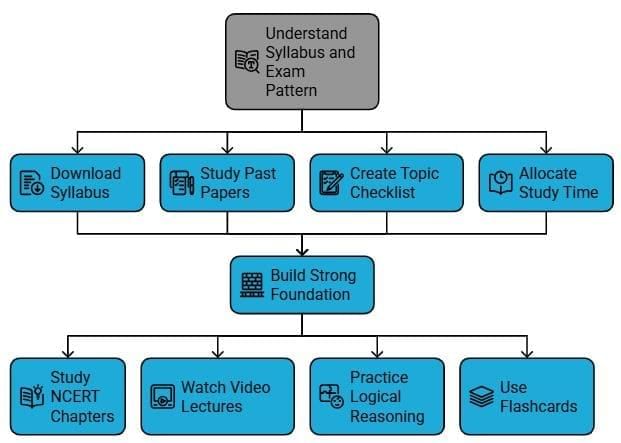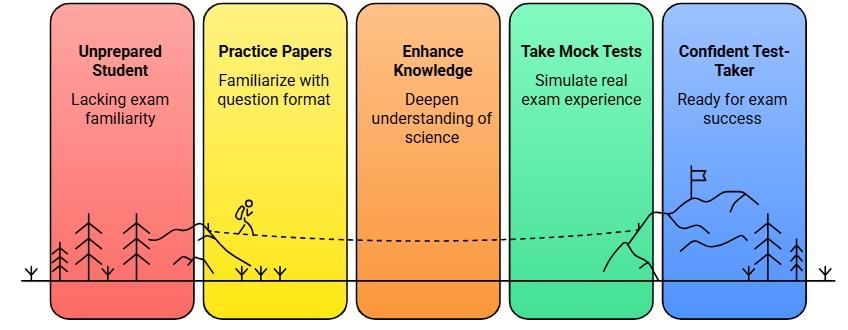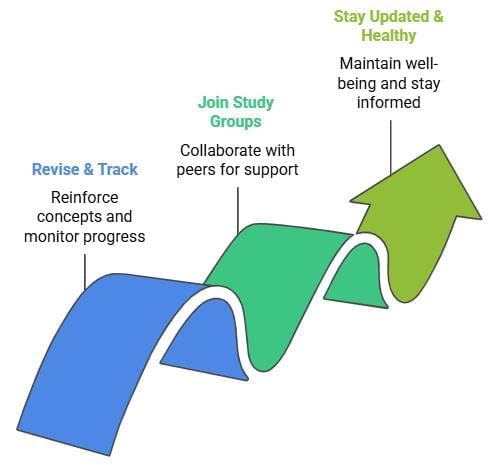NSO Preparation Guide with EduRev | Science Olympiad for Class 2 PDF Download
The National Science Olympiad (NSO) for Class 2 is organized by the Science Olympiad Foundation (SOF). It helps students learn more about science in a fun and interesting way. This guide shows how to use EduRev’s resources to get ready for the NSO 2025 - 2026. 
Syllabus and Exam Pattern
Syllabus
- Logical Reasoning: Patterns, odd one out, measuring units, grouping, ranking, spatial understanding, analogy.
- Science: Plants, animals, human body, food, housing and clothing, family and festivals, good habits and safety rules, transport and communication, air, water, weather, Earth, universe.
- Achievers Section: High-order thinking questions.
Exam Pattern
- Total Questions: 35 (Multiple-choice)
- Total Marks: 40 (1 mark for Logical Reasoning and Science; 2 marks for Achievers Section)
- Duration: 1 hour
- Sections: Logical Reasoning (5 questions), Science (25 questions), Achievers Section (5 questions)
- No Negative Marking
1. What You Will Learn and How the Exam Works
Objective: Gain a clear understanding of the topics covered and the structure of the NSO exam to focus your preparation effectively.
NSO Syllabus for Class 2: The syllabus typically includes topics like Plants, Animals, Human Body, Air and Water, Weather, Transport and Communication, Earth and Universe, and Logical Reasoning. The exam is divided into three sections:
- Section 1: Science (core concepts from the syllabus).
- Section 2: Logical Reasoning (patterns, odd one out, analogies, etc.).
- Section 3: Achievers Section (higher-order thinking questions).
- Exam Pattern: The NSO for Class 2 usually consists of 35 questions (1 mark each) to be answered in 60 minutes. Understanding the weightage of each section helps prioritize study time.
- Importance: Knowing the syllabus ensures you cover all topics, while understanding the exam pattern helps you anticipate question types (MCQs, true/false, etc.) and manage time during the test.
EduRev Resources:
- NSO Syllabus Overview: Download the detailed syllabus PDF for Class 2 from EduRev to have a clear roadmap.
- Past NSO Sample Papers: Access previous years’ papers to analyze recurring topics and question formats.
- Syllabus Notes: Use concise notes available on EduRev for quick reference to key topics.
Action Steps:
- Download Syllabus: Visit EduRev, locate the NSO Class 2 syllabus PDF, and print it for easy reference.
- Study Past Papers: Solve at least 2–3 past papers to identify common question types (e.g., picture-based questions, reasoning puzzles). Note the time taken to complete each section.
- Create a Topic Checklist: List all syllabus topics (e.g., Plants, Animals, Reasoning) and check them off as you cover them. For example:
- Plants: Types, parts, uses.
- Logical Reasoning: Patterns, grouping, ranking.
- Time Allocation: Spend 1–2 hours initially reviewing the syllabus and papers to familiarize yourself with the scope.
2. Understand the Basics
Objective: Develop a solid understanding of basic science concepts and logical reasoning skills to tackle both straightforward and tricky questions.
Details:
- Science Basics: Class 2 science focuses on foundational topics like the human body (organs, senses), plants (growth, types), animals (habitats, food), and environmental concepts (air, water, weather).
- Logical Reasoning: This section tests skills like identifying patterns, odd one out, analogies, and basic problem-solving, which are crucial for the Achievers Section.
- Why It Matters: A strong foundation ensures you can answer basic questions quickly, leaving more time for complex ones.
EduRev Resources:
- NCERT Solutions for Class 2 Science: Detailed explanations for each chapter, aligned with the NSO syllabus.
- Video Lectures: Short, engaging videos on topics like air, water, and the human body, designed for young learners.
- Flashcards: Quick-reference cards for key science facts (e.g., “Plants need sunlight to grow”).
Action Steps:
- Study NCERT Chapters: Dedicate 1 hour daily to reading and understanding one NCERT chapter (e.g., “Plants” or “Air and Water”). Use EduRev’s NCERT solutions to clarify concepts.
- Watch Video Lectures: Spend 30 minutes daily watching 1–2 videos on topics like the human body or weather to reinforce learning through visuals.
- Practice Logical Reasoning: Solve 5–10 reasoning questions daily (e.g., “Which animal is different?” or “Complete the pattern”). Use EduRev’s reasoning quizzes for practice.
- Use Flashcards: Review 5–10 flashcards daily to memorize key facts (e.g., “Lungs help us breathe” or “Roots absorb water”).

3. Practice with Sample Papers
Objective: Get familiar with the NSO question format and improve time management under exam-like conditions.
Details:
- Why Practice Papers?: Sample papers simulate the real exam, helping you understand question difficulty, format (e.g., MCQs with pictures), and time constraints.
- Achievers Section: This section includes challenging questions that require deeper understanding or application of concepts, so extra focus is needed.
- Goal: Build confidence and reduce exam anxiety by practicing regularly.
EduRev Resources:
- NSO Sample Papers for Class 2: A collection of papers with varying difficulty levels.
- Practice Worksheets: Topic-specific worksheets for targeted practice.
- Achievers Section Model Tests: Specialized tests focusing on higher-order thinking questions.
Action Steps:
- Solve Sample Papers: Start with one sample paper per week, timing yourself (60 minutes for 35 questions). Gradually increase to two papers per week as the exam approaches.
- Review Answers: Use EduRev’s answer keys to check your responses. Note mistakes and revisit related topics (e.g., if you miss a question on “Water Cycle,” review that concept).
- Focus on Achievers Section: Dedicate 30 minutes weekly to solving Achievers Section questions. These often combine science and reasoning (e.g., “Why do plants need water?” with multiple reasoning steps).
- Track Time: Aim to spend 1–2 minutes per question initially, reducing to 1 minute as you improve.
4. Learn More About Science
Objective: Deepen your understanding of science topics to confidently answer both basic and advanced questions.
Details:
- Key Areas: Focus on topics like plants (types, parts, uses), animals (habitats, food chains), environment (pollution, conservation), and practical concepts (transport, weather).
- Reasoning Skills: Strengthen logical thinking to handle questions that require analysis or pattern recognition.
- Why It Matters: A deeper understanding helps you tackle the Achievers Section and apply concepts to real-life scenarios.
EduRev Resources:
- Video Tutorials: Engaging videos on plants, animals, and environmental topics, tailored for Class 2.
- Logical Reasoning Worksheets: Practice sheets for patterns, analogies, and grouping.
- Question Banks: Topic-specific questions on transport, weather, and more.
Action Steps:
- Learn Daily Facts: Memorize 5–10 science facts daily using EduRev’s notes or videos (e.g., “Camels store water in their humps” or “Rain is part of the water cycle”).
- Practice Reasoning: Solve 5–10 reasoning questions daily (e.g., “Which vehicle is used on water?” with picture options). Use EduRev’s worksheets for variety.
- Use Interactive Worksheets: Complete one worksheet daily on topics like plants or animals to reinforce learning through practice.
- Relate to Real Life: Observe real-world examples (e.g., watch plants in your garden or discuss weather changes with parents) to connect concepts.
5. Take Mock Tests
Objective: Improve speed, accuracy, and exam readiness by simulating the real NSO experience.
Details:
- Why Mock Tests?: They help you practice under timed conditions, identify weak areas, and build confidence.
- Goal: Achieve at least 80–90% accuracy in mock tests before the exam.
- Time Management: Learn to allocate time effectively (e.g., 40 minutes for Sections 1 and 2, 20 minutes for Achievers Section).
EduRev Resources:
- NSO Mock Test Series: Full-length tests designed to mimic the actual exam.
- Test Analysis Tools: Detailed performance reports to identify strengths and weaknesses.
Action Steps:
- Take Biweekly Mock Tests: Schedule one 1-hour mock test every two weeks initially, increasing to weekly closer to the exam.
- Analyze Errors: Use EduRev’s test analysis tools to review incorrect answers. For example, if you miss a question on “Animals,” revisit that topic’s notes or videos.
- Improve Speed: Track time per question (aim for 1 minute or less). Practice skipping tough questions and returning to them later.
- Simulate Exam Day: Take tests in a quiet environment with a timer to mimic real conditions.

6. Revise and Track Progress
Objective: Reinforce learned concepts and monitor improvement to ensure readiness.
Details:
- Revision: Regular revision prevents forgetting key concepts and strengthens memory.
- Progress Tracking: Analyzing performance helps identify areas needing more focus.
- Why It Matters: Consistent revision and tracking ensure you’re well-prepared for all topics.
EduRev Resources:
- Revision Notes and Cue Cards: Concise summaries and flashcards for quick review.
- Topic-Wise Tests: Short tests to assess mastery of specific topics.
Action Steps:
- Follow a Revision Schedule: Dedicate 1 hour weekly to revise one major topic (e.g., Plants on Monday, Animals on Tuesday). Use EduRev’s revision notes.
- Use Flashcards: Review 5–10 cards daily for quick recall of facts (e.g., “What do animals eat?”).
- Take Topic-Wise Tests: Complete one short test (10–15 questions) per topic weekly to check understanding.
- Track Performance: Use EduRev’s analytics to monitor scores and identify weak areas (e.g., low scores in reasoning).
7. Learn with Friends
Objective: Collaborate with peers to clarify doubts, share knowledge, and stay motivated.
Details:
- Why Study Groups?: Group discussions encourage active learning, expose you to different perspectives, and make studying fun.
- Role of Guidance: Teachers or parents can provide expert insights and clarify complex concepts.
- Goal: Build a supportive learning environment.
EduRev Resources:
- Community Forums: Platforms to discuss questions and share tips with other NSO aspirants.
- Online Live Classes: Interactive sessions with expert teachers.
Action Steps:
- Join Virtual Study Groups: Sign up for EduRev’s community forums and participate in discussions on Class 2 NSO topics.
- Attend Live Classes: Join 1–2 live classes weekly on EduRev for interactive learning and doubt resolution.
- Seek Guidance: Discuss difficult topics (e.g., Achievers Section questions) with parents or teachers for clarity.
- Share Knowledge: Explain concepts to peers in the group to reinforce your understanding.
8. Stay Ready and Healthy
Objective: Stay informed about exam updates and maintain physical and mental well-being for optimal performance.
Details:
- Exam Updates: Stay aware of exam dates, syllabus changes, or registration deadlines.
- Health and Well-Being: A balanced lifestyle improves focus, memory, and stamina during preparation and the exam.
- Why It Matters: Stress or fatigue can affect performance, so a healthy routine is crucial.
EduRev Resources:
- Exam Updates: Notifications about NSO dates and syllabus changes.
- Motivational Videos: Content to keep you inspired and focused.
Action Steps:
- Follow a Balanced Schedule: Study for 1–2 hours daily, with breaks every 30 minutes. Include 1 hour of play or relaxation.
- Maintain a Healthy Lifestyle: Eat nutritious food, sleep 8–9 hours nightly, and exercise (e.g., 15 minutes of outdoor play) daily.
- Subscribe to Notifications: Enable EduRev notifications for exam updates and new resources.
- Watch Motivational Videos: Spend 10 minutes weekly watching EduRev’s motivational content to stay inspired.

Additional Tips for Success
- Start Early: Begin preparation 2–3 months before the exam to avoid last-minute stress.
- Stay Consistent: Study daily, even for 30–60 minutes, to build a strong foundation.
- Ask for Help: Don’t hesitate to clarify doubts with teachers, parents, or EduRev forums.
- Stay Positive: Celebrate small achievements (e.g., scoring 30/35 in a mock test) to stay motivated.
By following this detailed strategy and leveraging EduRev’s resources, you’ll be well-prepared to excel in the NSO for Class 2. Stay focused, practice regularly, and maintain a healthy balance to perform your best on exam day!
|
40 videos|50 docs|63 tests
|
FAQs on NSO Preparation Guide with EduRev - Science Olympiad for Class 2
| 1. What is the NSO exam, and what does it assess for Class 2 students? |  |
| 2. How should I prepare my child for the NSO exam in Class 2? |  |
| 3. What is the exam pattern for the NSO for Class 2? |  |
| 4. What are some effective preparation strategies for the NSO exam? |  |
| 5. Are there any additional tips for success in the NSO exam for Class 2? |  |
















